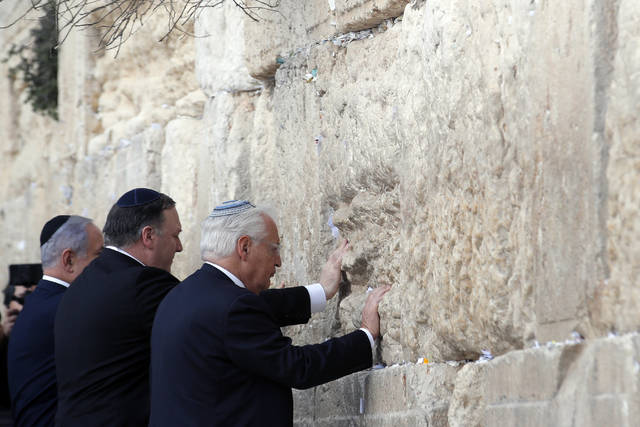JERUSALEM — U.S. Secretary of State Mike Pompeo paid a solemn visit Thursday to Jerusalem’s Western Wall along with Israeli Prime Minister Benjamin Netanyahu in an apparent sign of support for Israel’s control of the contested city.
Pompeo is the highest-ranking American official to tour the holy site with any Israeli leader. His visit was likely to further infuriate the Palestinians, who already have severed ties with the U.S. over its Jerusalem policies.
Pompeo and Netanyahu prayed at the wall, the holiest site where Jews can pray, before depositing written prayers in its crevices and then touring nearby tunnels and synagogue. Neither made any public comment at the site.
The secretary said he thought it was important to visit the wall with the Israeli leader as a show of support for Israel.
“I think it’s symbolic that a senior American official go there with a prime minister of Israel,” he said before making the trip. “It’s a place that’s important to many faiths and I’m looking forward to it. I think it will be very special.”
Pompeo’s trip comes while Netanyahu is in the midst of a tight re-election campaign that could get a boost from the visit of the secretary of state. Pompeo has said his trip has nothing to do with politics.
Israel captured east Jerusalem and the Old City in the 1967 Mideast war, and for decades, U.S. officials refrained from visiting the Western Wall with Israeli leaders to avoid the appearance of recognizing Israeli sovereignty over the city’s most sensitive holy sites. The Palestinians seek east Jerusalem as the capital of a future state.
But the Trump administration has upended the longstanding policy, moving the U.S. Embassy to Jerusalem last year after recognizing the city as Israel’s capital. Israel claims all of Jerusalem as its eternal and indivisible capital.
The administration has developed close ties with Netanyahu, who is scheduled to visit the White House next week. In addition to its policies toward the Palestinians, the U.S. has taken a hard line toward Iran, much to Netanyahu’s delight.
Senior U.S. officials, including President Donald Trump and numerous predecessors, have visited the wall privately in the past, but never with an Israeli leader.
In December, Trump’s ambassador to Israel, David Friedman, appeared at the Western Wall with Netanyahu, and in January, Trump’s national security adviser, John Bolton, toured the site with top aides to the Israeli leader.
The Old City is home to Jerusalem’s most sensitive holy sites, including the Western Wall and the Church of the Holy Sepulcher, where tradition says Jesus was entombed and resurrected. Pompeo, a devout Christian, also stopped at the church.
Next to the Western Wall is a hilltop compound revered by Jews as the Temple Mount and by Muslims as the Noble Sanctuary. The spot, which once housed the biblical Temples, is the holiest site in Judaism and today is home to the Al-Aqsa Mosque, the third-holiest site in Islam.
The competing claims to the site are a frequent source of tension and lie at the heart of the Israeli-Palestinian conflict.
When Trump recognized Jerusalem as Israel’s capital, he said it did not determine the city’s final borders. But the gesture was perceived as unfairly siding with Israel and prompted the Palestinians to sever ties with the U.S. The Palestinians already have rejected a planned Mideast peace initiative by the administration.
Nabil Abu Rudeineh, spokesman for Palestinian President Mahmoud Abbas, said Pompeo’s visit added additional obstacles to peace hopes. “While they are claiming to be trying to solve the conflict, such acts only make it more difficult to resolve,” he said.
While previous secretaries of state have traditionally met with the Palestinians when visiting the region, Pompeo has no such talks planned.
“The Israelis and Palestinians live side-by-side. We need to help them figure out how to do that,” Pompeo said. “It’s a fact, and this administration wishes well for the Palestinian people.”
In addition to the Jerusalem recognition, the administration also has cut hundreds of millions of dollars in aid to the Palestinians, helping fuel a financial crisis for Abbas’ Palestinian Authority.
At a meeting with Pompeo, Israel’s President Reuven Rivlin expressed his deep concern about the Palestinians, both in the Hamas-ruled Gaza Strip and under the internationally backed Palestinian Authority in the West Bank.
“If the Palestinian Authority will collapse, we will have to take care about what is going on,” he said.


